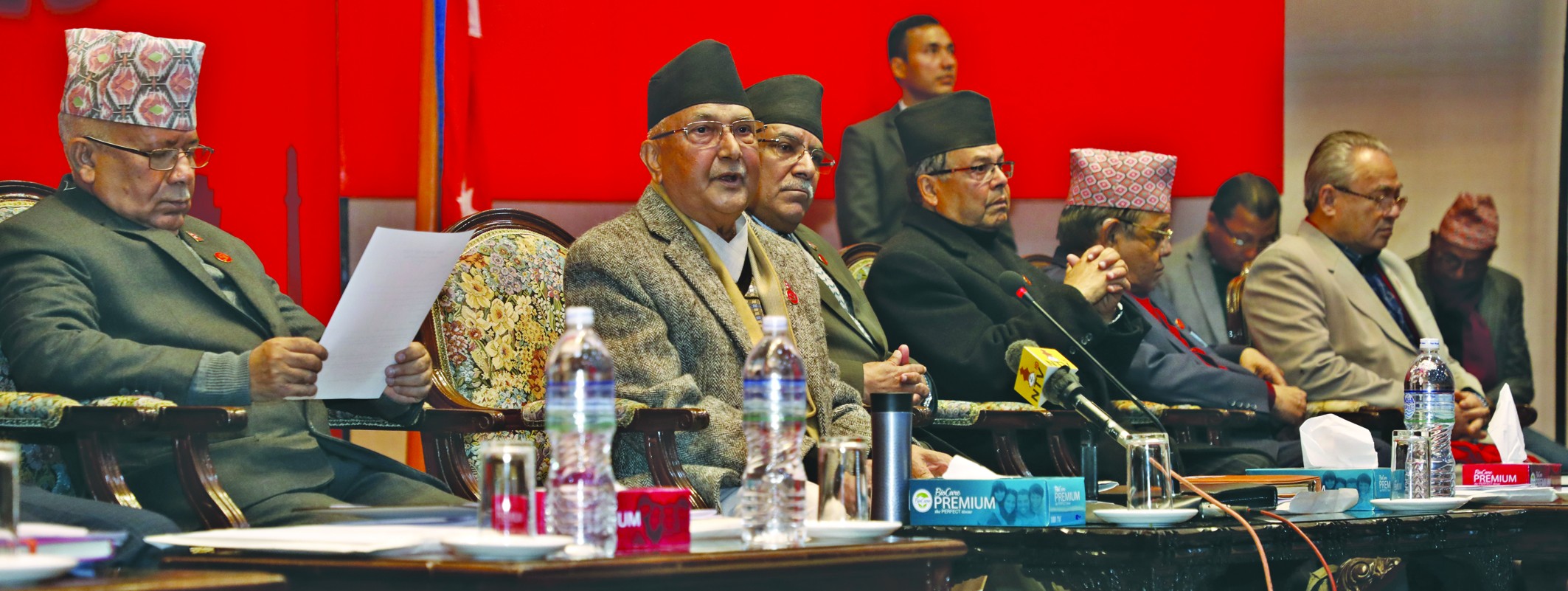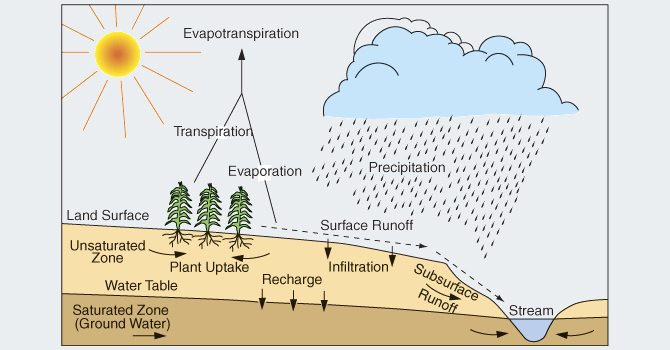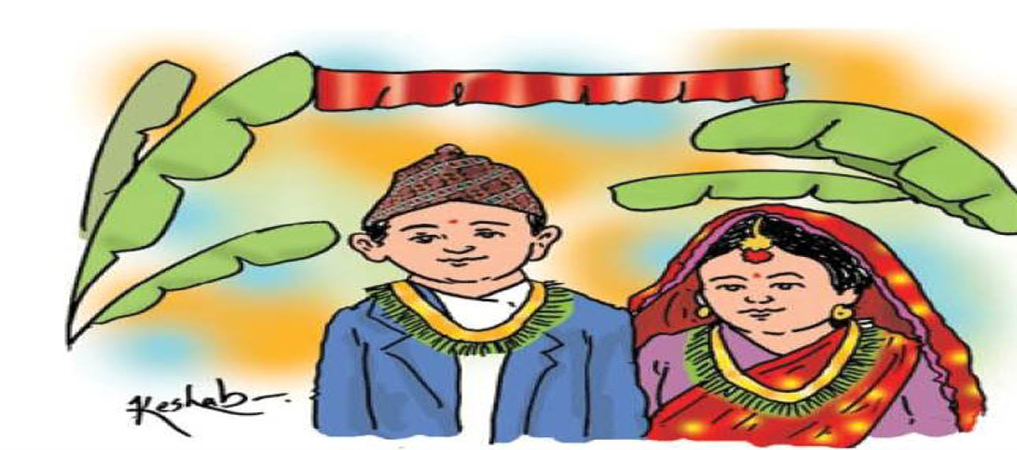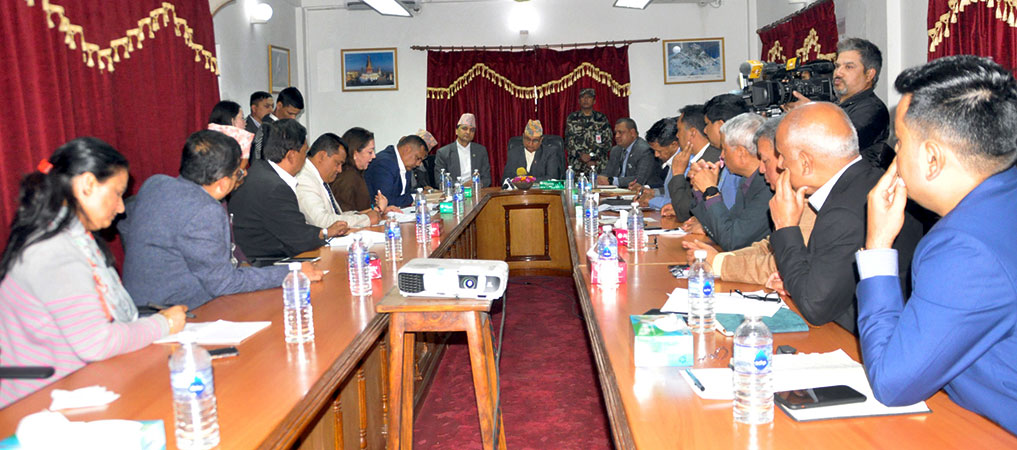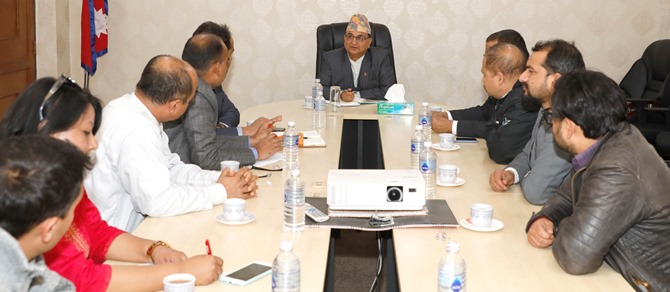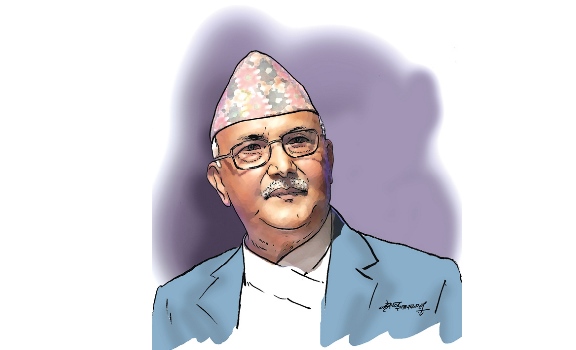Enforcing poll expenditure limit is a difficult task for EC

Kathmandu, Apr. 10: The country is abuzz with the May 13 local level election. It’s been more than a month since the political parties have concentrated their activities at the lower rung and now they are busy selecting candidates for 753 local units.
As the election date gets closer, the issue of electoral campaign spending is under discussion once again.
The poll authority this year has been pushing for greater transparency in election-related expenditure by parties and candidates through a strict election code of conduct, which came into effect from Friday midnight.
The code of conduct has put a ceiling on poll expenditure for candidates in the electoral fray and ruled against extravagant use of publicity materials. The EC has put a Rs. 7.5-lakh ceiling on poll expenditure for candidates vying for the post of mayor and deputy mayor of a metropolitan city.
Similarly, the EC has fixed Rs. 5.5-lakh expenditure limit for candidates of mayor and deputy mayor of sub-metropolitan cities, Rs. 4.5-lakh and Rs. 3.5-lakh expenditure ceiling for those vying for posts of chief and deputy-chief of municipalities and rural municipalities.
The candidates of ward chairperson and members of metropolis, sub-metropolitan cities, municipalities and rural municipalities can spend a maximum Rs. 300,000, Rs. 250,000, Rs. 200,000 and Rs. 150,000 respectively.
During the election of the district coordination committee, the expenses incurred by the chief have been reduced. The chief and deputy-chief will be allowed to spend Rs. 50,000 and the members only Rs. 25,000.
The EC has set the same expenditure ceiling that was applied in the last local poll held five years ago.
Once the candidates are nominated, they will have to follow the EC’s instruction on expenditure limits. They have to keep an eye on their spending, under-secretary at EC Surya Prasad Aryal said. “Limits on campaign expenditure are meant to provide a level-playing field for everyone contesting elections.”
According to him, the political parties or candidates would have to furnish details of their expenditure to the District Election Office within a certain time frame.
Candidates must mandatorily file a true account of election expenses with the EC, said Aryal, adding, “Under the Section 26 of the Election Commission Act, an incorrect account or expenditure beyond the ceiling would be liable to fine equal to the amount spent or the amount equivalent to the threshold whichever is greater.”
The commission is even authorised to scrap the candidacy for failure to adhere to the code of conduct, he added.
The political parties taking part in the local poll have already expressed commitment to fully abide by necessary rules and laws in order to hold elections in a free and fair manner.
The EC has pledged to act against candidates if they submit fake reports. However, the EC is still uncertain about how to compel the parties to comply, as there is no robust mechanism to keep parties' and candidates' expenses in check.
Aryal said the commission has formed election commissioner Ram Prasad Bhandari-led committee at the
central level to monitor the implementation of the code of conduct.
Similarly, such committees have been formed at district, constituency and local levels. The arrangement has been made for reporting through micro monitors if anyone violates the code of conduct, he added.
However, stakeholders are not convinced that the EC will take any tough action, since there is no single evidence of EC’s acting against any candidate spending beyond their ceiling in the past and candidates also tend to conceal their actual expenditure.
Aryal maintained that the EC had not received such complaints in the past specifying overspending by any candidates.
“The commission could conduct an investigation if a complaint with evidence to prove there was violation of the code of conduct by overspending is lodged,” he added.
It is an open secret that elections are getting costlier with each passing election. Despite all limitations set by the poll body, the cost of electoral campaigns is ratcheting further upwards. Candidates are spending lavish amounts ignoring EC’s threshold.
Rs. 70 billion spent in last election
A study carried out by the Election Observation Committee (EOC), Nepal, showed that the government, political parties and candidates spent an estimated Rs. 69.42 billion in total in the local election 2017.
As per the report, the government spent Rs. 18.46 billion while the candidates and their supporters spent Rs. 50.96 billion in total.
Similarly, per voter cost during the local poll amounted to Rs. 4,923 as there were a total of 14.1 million eligible voters in the local election.
EOC chairman Pradip Pokharel said out of total general election expenditures of 2017/18, government spent 30 per cent, donor agencies 7 per cent, political parties 3 per cent and remaining 60 per cent was spent by the candidates and their supporters.
The report showed that overall expenditure surged as most of the candidates spent beyond the limits set by EC, he claimed.
The candidates and their supporters were found spending a maximum amount of money on the cadres' mobilisation, their lodging, food and travel expenses, said Pokharel, adding, “In the previous elections candidates were lavishly spending on campaigning, flouting the code of conduct.”
“The EC has been weak in enforcing the law regarding the spending beyond the threshold set by the commission, which has developed a culture of impunity,” said Pokharel. He, however, appreciated Chief Election Commissioner Dinesh Thapaliya for coming up with stringent measures to control spending of parties and candidates through the code of conduct.
Anti-corruption campaigners say that the failure to ensure financial transparency in political parties has facilitated corruption.
To make the poll expenditure transparent, the EC has instructed political parties to receive more than Rs. 25,000 in donation from any person through the banking system.
Former government secretary and former president of Transparency International Nepal (TIA) Khemraj Regmi said according to TIA Nepal report 13 per cent of voters are offered bribes in exchange for their votes.
“Fraudulent and undeclared funding of political parties is one of the root causes of political corruption in Nepal,” Regmi said.
“Many parties and their candidates spend more money on campaigning than their known sources. To win the election, they raise funds from people who make money illegally,” said Regmi.
“After winning the election, corrupt candidates try to recoup it and are forced to act according to the interests of their donors. This leads to a chain of corruption, as seen across the country,” he added. Due to such culture, honest people would be sidelined gradually, as they lack money to compete in electoral fray, he said, adding, “People should be made aware to control such bad practice and assist genuine people to contest the election.”
Recent News

Do not make expressions casting dout on election: EC
14 Apr, 2022
CM Bhatta says may New Year 2079 BS inspire positive thinking
14 Apr, 2022
Three new cases, 44 recoveries in 24 hours
14 Apr, 2022
689 climbers of 84 teams so far acquire permits for climbing various peaks this spring season
14 Apr, 2022
How the rising cost of living crisis is impacting Nepal
14 Apr, 2022
US military confirms an interstellar meteor collided with Earth
14 Apr, 2022
Valneva Covid vaccine approved for use in UK
14 Apr, 2022
Chair Prachanda highlights need of unity among Maoist, Communist forces
14 Apr, 2022
Ranbir Kapoor and Alia Bhatt: Bollywood toasts star couple on wedding
14 Apr, 2022
President Bhandari confers decorations (Photo Feature)
14 Apr, 2022


